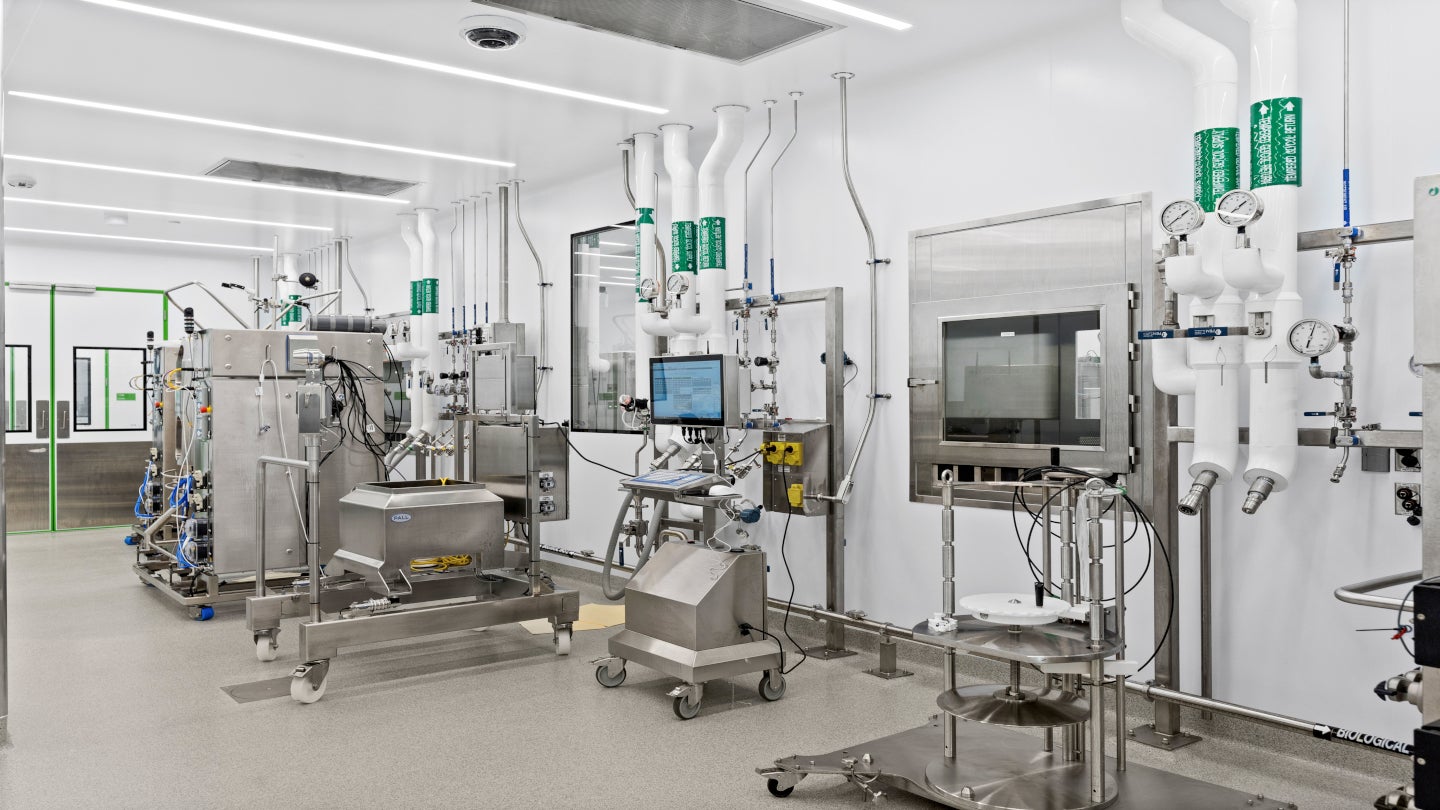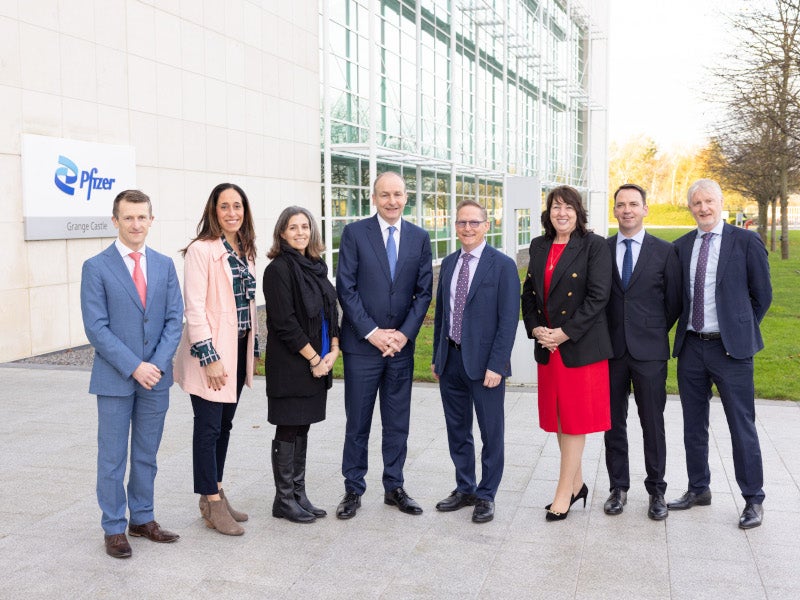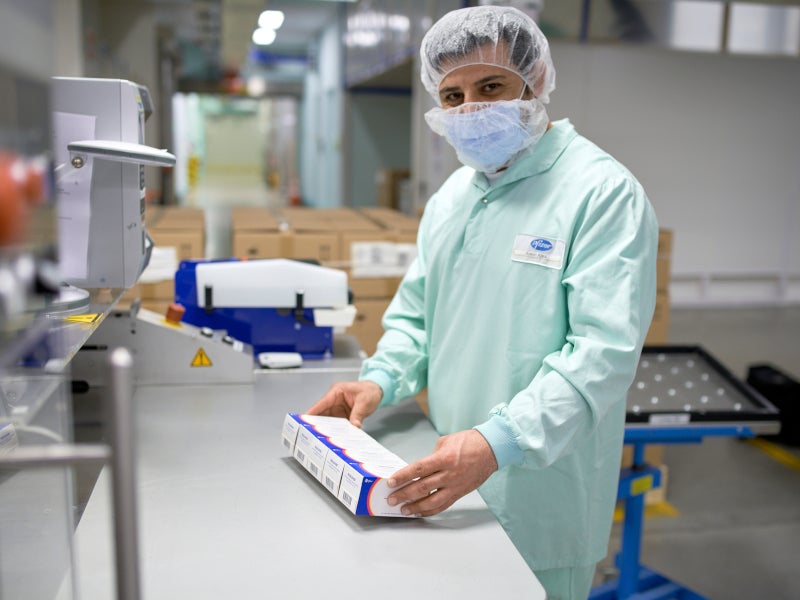Pfizer’s Worldwide Research and Development (WR&D) division developed the Global Biotherapeutics Technology group at Grange Castlewellan, Ireland, in 2006. The unit was formed as a global leader in protein drug discovery.
The biotechnology campus was originally built at an estimated cost of $1.8bn by Wyeth (earlier known as American Home Products). The facility became part of Pfizer’s assets in October 2009 when it acquired Wyeth.
The Grange Castle plant is the largest integrated biotechnology plant in Ireland and is part of the Pfizer speciality biotech manufacturing network.
Pfizer will now invest more than €1.2bn ($1.26bn) to build a new facility in the same site premises to double the biological drug substance manufacturing capacity of the campus. The expansion will increase the manufacturing and laboratory capacity and add new technologies to the campus. It will extend Pfizer’s capabilities for approved and pipeline drugs for oncology, immunology, rare diseases, internal medicines and inflammation.
Construction work for the expansion is expected to begin in 2024. To be completed in 2027, it will generate between 400 and 500 jobs.
Pfizer’s Clondalkin biopharmaceutical plant location
The multiproduct biopharmaceutical campus is located at the 90-acre Grange Castle International Business Park in Clondalkin, Ireland. It is strategically located, as Ireland is a prime location for pharmaceutical investments in Europe.
The facility is part of Pfizer’s speciality biotech operating unit, which also includes Pfizer’s facilities in Andover, Sanford and Pearl River, US; Havant, UK; Algete, Spain, and Strangnas, Sweden.
Pfizer’s biotechnology campus details
The Pfizer biotechnology campus focuses on the production of active pharmaceutical ingredients (APIs), solid-dose pharmaceuticals, sterile injectables, biopharmaceuticals and vaccines. It houses a cutting-edge pilot plant, laboratories and equipment for the development and manufacture of a wide range of biological drugs.
Aseptic syringe filling, protein purification, vaccine conjugation and large-scale mammalian cell culture are the primary manufacturing technologies used in the facility.
The site houses groups involved in the product development process, including the Manufacturing Sciences and Technology Group, the Technical Services Group and the Global Biotherapeutics Technologies Group.
Phases of the biotechnology plant’s expansion
The original facility was designed to meet its current needs and future capabilities. It facilitates the manufacturing of bulk drug substances and fill-finishing biologics, vaccines and antibiotics in one campus.
In April 2007, the development laboratory at the facility was expanded from 2,500m² to 8,500m² , which required an investment of $32m and was fully supported by the Irish Development Agency.
In 2009, Suite A1 was built to support a clinical programme, while a second syringe line was added to Suite Three in 2010.
Pfizer announced a €145m ($200m) expansion of the facility in September 2011. Works included the construction of Suites Two and Four, adding 4,263m² of building space.
Suite Three was expanded to manufacture pre-filled syringes for Pfizer’s drug Prevenar 13. A cell bank storage expansion was also undertaken at the site.
Pfizer announced a €300m ($298m) capital investment in November 2020 to support the expansion of the production facilities in Grange Castle, Newbridge and Ringaskiddy.
In May 2021, the company invested another $40m to expand the Grange Castle site for production of the Pfizer-BioNTech Covid-19 mRNA vaccine in response to the facility’s inclusion in the Global Pfizer Covid-19 manufacturing network.
Manufacturing and drug development
The drug development unit moves products from the research pipeline to commercial-scale manufacturing. It coordinates and validates technologies and procedures required to take drug substances into full production.
The drug substance facility carries out the beginning and intermediate stages of manufacture for cell culture products, which include media preparation, fermentation and purification.
Products are then packaged as sterile vials. The production stages include formulation, vial preparation, filling, capping and inspection.
Drugs produced at Pfizer’s facility
The plant is used to manufacture biological active drugs and investigational drug products for clinical trials.
It produces etanercept, an active ingredient in the rheumatoid arthritis drug Enbrel®, and manufactures the paediatric pneumococcal conjugate vaccine Prevenar®.
The site produces drugs, anti-infectives and vaccines for arthritis, inflammation, cancer, haemophilia, pain and stroke.
Campus construction
Development work on the Grange Castle facility began in October 2002. The construction schedule was planned to carry out limited production in the final quarter of 2004 for validation, which in turn allowed the plant to open on schedule in September 2006.
The construction required more than 15,000t of structural steel, 160,000ft of process piping, 2,400 items of equipment, 7,587 engineering drawings and 1,200 specific validation protocols.
Contractors involved
Consulting engineers who worked on the Pfizer biotechnology campus included Jacobs Engineering, an engineering services company, Bovis Lend Lease, a construction management company, and Arup Consulting Engineers, an engineering consultancy services provider.
Project management was overseen by Wyeth Medica Ireland, Wyeth BioPharma and Wyeth Global Engineering.
Project management support was provided by professional services firm Arup, project and programme management consultancy Atkins Faithful & Gould, management consulting firm Bio-Pharmaceutical Consulting, and consulting and financial planning services provider Keating & Associates. PCM Consulting, a project and cost management consulting company, is involved in the $1.26bn expansion project.
Contractors also included civil engineering company Roadbridge, engineering contractor Mercury Engineering, electrical and instrumentation engineering solutions provider Suir Engineering, steel fabrication and construction company Cronin Buckley, construction group SIAC, builder and contractor John Sisk and Son, and GF May.
Other contractors included equipment supplier Fisher, HA O’Neill, Jones Engineering Group, roofing and waterproofing solutions provider GFM System, flooring solutions provider Crean Mosaics, design and build solutions provider Bruns Pak, cladding solutions supplier Prince Cladding and laboratory construction company PJ Hegarty.
Equipment for the fit-out of the facility was provided by BOC Edwards, medical technology company Bosch, separation and fluid handling solutions provider Alfa Laval, membrane supplier Millipore, medical equipment company Steris, purification solutions provider Aqua Chem, energy management solutions provider Schneider Electric Ireland, and wastewater treatment systems provider Veolia Water (formerly Vivendi Water Systems).
Zenith Technologies was the automation and control supplier. HA O’Neill subcontracted Gallagher & McKinney, an engineering solutions company, for mechanical installation works, refurbishment and expansion of the existing Grange Castle plant.






